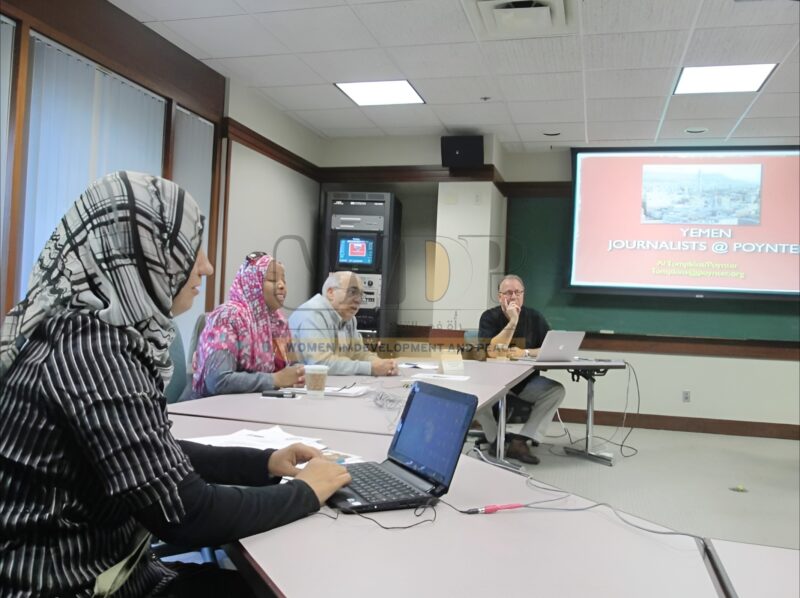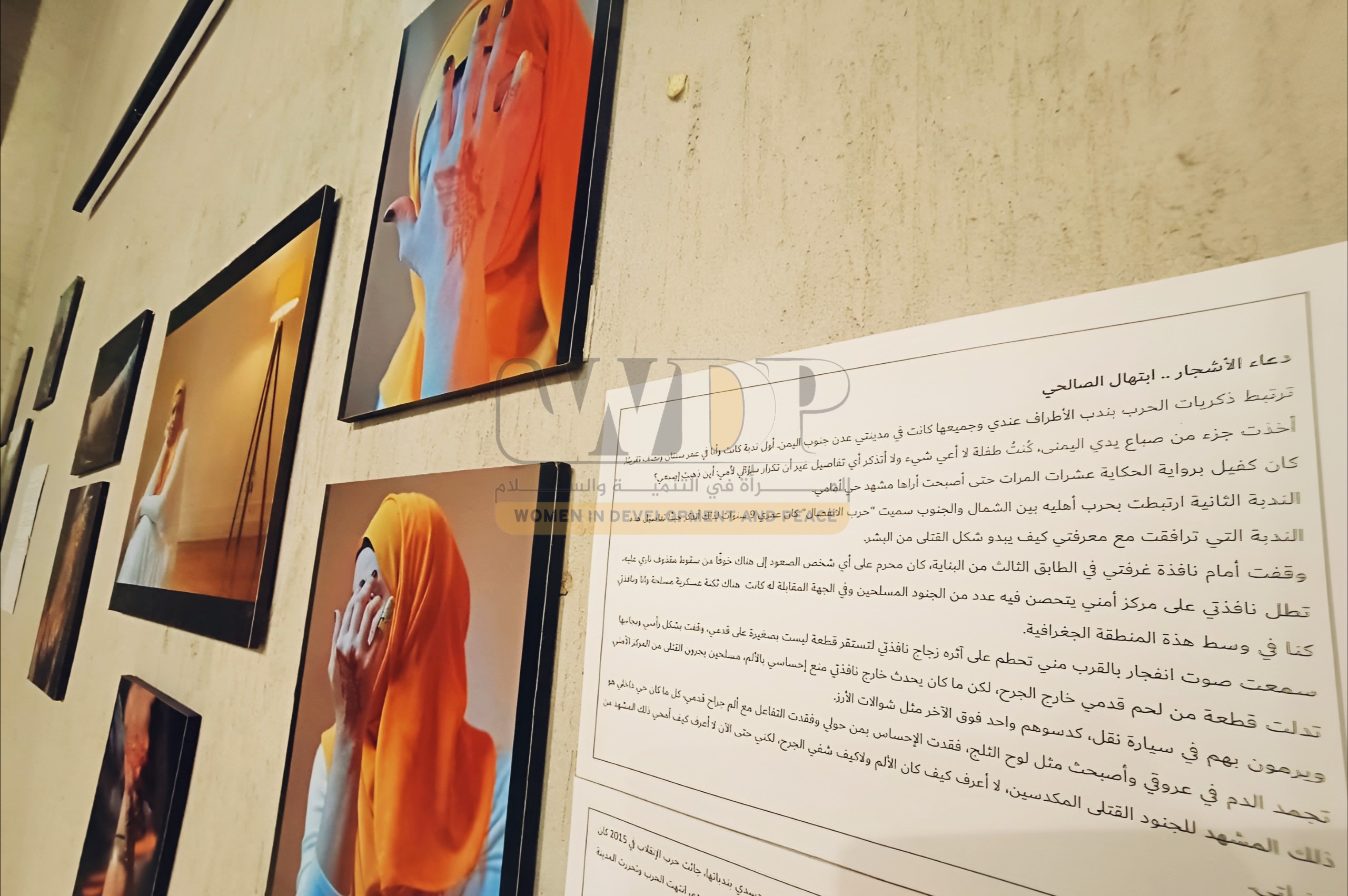Haneen Al-Wahsh – Women in Development and Peace
Women in Yemen are considered the weakest link in the ongoing conflict; they bear the greatest burden from the repercussions of unstable conditions. Besides the overall humanitarian suffering, they are subjected to various forms of violence and rights violations, which has driven some to make tough decisions like migration or seeking asylum.
Journalist Sahar Muhammad, a Yemeni migrant outside her homeland, says that in Yemen, she was forcibly kept away from the political reality of the country with the outbreak of armed conflict. Her work as a journalist became dangerous, and journalism turned into a male-dominated profession focused on covering armed clashes on the front lines, as she describes.
Sahar emphasizes that she faced much exclusion and marginalization, stating, “Employment criteria are subject to nepotism, which has been dominant for a long time, but the conflict has exacerbated it. This, among other consequences, was enough to push her to seek migration opportunities and work abroad, which she successfully managed to do.”
The Dream of Migration
The conditions of conflict controlling various aspects of life in Yemen have been a strong incentive for Yemeni women to decide to migrate in search of a new footing; to shape a life that aligns with their dreams and aspirations, where they can enjoy at least minimal levels of appreciation and rights for themselves and their families.
“Migration is the dream of every Yemeni, man or woman,” says Laila Al-Hamdani, to confirm that the state of political, social, and economic instability amidst the armed conflict has driven many Yemeni dreams towards migration, seeking a safe life, decent living, and suitable job opportunities.
Laila migrated in the early years of the conflict outside her homeland. More specifically, she says, “The early years of the conflict were an early omen of doom, as all our small projects were shattered, with no way to compensate for them and no hope in sight for the conflict’s area to shrink, which required her to think about migrating abroad and starting a small project.”
Laila settled in Oman, where her project saw its second birth – if not its true birth – after being buried by the conflict in Yemen. She says, “I faced many challenges at many airports due to my nationality and belonging to a country in conflict and deadly fighting, yet I received special treatment in Muscat, which encouraged me to establish my business project there.”
Laila stormed the business market in Muscat with notable expertise and understanding; she says, “The support from the people in Oman alongside the support from the Omani government helped me to continue implementing my project and led me towards achieving many successes.” She adds, “Within four years, I managed to open eight branches for selling perfumes and incense, and I plan to open more.”
Laila entered the world of commerce from her work in marketing as a media graduate. Despite the demands of her expanding business, she maintains her passion for media; she says, “I still use my expertise in content creation by producing visual ads for many shops here using my accounts on Instagram, TikTok, and others.”
The Curse of Conflict
Rasha Ahmad left Taiz city for Egypt, carrying dreams of completing her higher education there with personal support from her family, hoping to find new companionship in an ideal environment. However, the curse of the armed conflict in her country continued to follow her. She says, “I met colleagues from various nationalities, but I notice their wariness towards me because I come from a country where people are at each other’s throats.”
Rasha confirms she received an acknowledgment from one of her expatriate colleagues, saying, “My colleague told me that her family had warned her when she mentioned she had a Yemeni friend, claiming that we are a violent and trouble-making people.”
Rasha emphasizes that she receives special treatment from the majority for various reasons, most notably because she comes from a country of diaspora while neighboring Arab nations describe this same country as the “origin of the Arabs.”
What Rasha describes as the curse of conflict, Hayam Muhammad experiences in a different way. Hayam, who pursued her dream of obtaining an overseas job, found that returning to her homeland became one of the impediments and conditions set by her employer.
Hayam explains, “My job is to read and analyze the political and social situations in Yemen based on the developments, for one of the research centers; I work on this with passion and receive a good salary, but the entity I work for stipulates that I must not return to my homeland in these conditions for my safety.”
For Hayam, this seems like an unfair tax, yet she notes that it’s better than biting the fingers of idleness and poverty in the country.
Adaptation Challenges
Arwa Kamil (a pseudonym) traveled early last year with her family to Canada where her father works. This was after she graduated from medical school at a private Yemeni university with excellent grades, her hopes pinned on her excellence until she discovered that the host country has its assessments.
“I was looking for a job, and now I am looking for recognition of my university degree,” says Arwa, emphasizing that her university degree has not received any recognition or acceptance that would qualify her to work under probation. While moving around in search of employment, she confirmed that she faces other challenges, including not adapting to differences in customs, traditions, and communication styles, which formed a barrier to her attempts to integrate into her new community.
Yemeni migrant women face many challenges, most notably language barriers, cultural and social adaptation conditions, building networks that enable them to integrate with the host communities, and finding job opportunities that align with their educational specializations.
While these challenges have been an obstacle for some, they have not succeeded in isolating the aspirations of other Yemeni women who managed to integrate with the global market and achieved exemplary success. Among them are women who have been able to own their independent businesses in the United States, becoming economic contributors to the host country as well as their homeland.
Press reports confirm that the ongoing conflict in Yemen has significantly affected the lives of Yemeni women, pushing them to decide to migrate in search of safety and a dignified life. As the conflict continues, this phenomenon is expected to persist, negatively affecting the reality of Yemeni women inside the country across various fields and in different service and developmental sectors.


